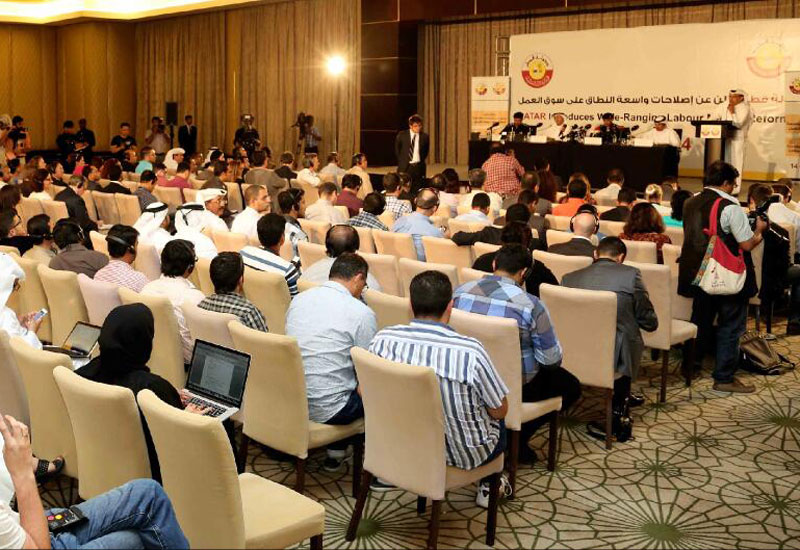The State of Qatar has revealed plans to replace the current sponsorship – or kafala – system for foreign workers and replace it with a system based on employment contracts.
Designed to strengthen existing labour laws and improve the living and working conditions of all workers, the measure will see the current exit permit system, which requires the employer’s consent for an employee to leave the country, replaced with an automated system through the Ministry of Interior.
The ‘Metrash2’ e-government system will automatically grant an exit permit to an employee after a 72-hour grace period prior to departure.
The reforms follow heavy scrutiny of working conditions in the country, with international focus coming in the run up to the 2022 World Cup.
Under the new law, the employer will also no longer be financially liable for their employee. Any financial obligations incurred by the employee while in Qatar will be governed by State’s Civil and Commercial law.
A new employment contract system will replace the No Objection Certificates, which currently regulate the transfer of employees to different employers. If their employment contract is for a fixed term, employees will be able to transfer to another employer at the end of that term.

| Advertisement |
If the employment contract is on an indefinite duration, the employee will be able to transfer to another employer after five years from the date of the contract. All existing contracts will remain valid until employers bring them in line with the new model contract within a one year grace period from the time the new law goes into effect.
When the new law goes in to effect, the illegal practice of passport confiscation will be addressed by an increase of current penalty of a maximum of QAR10,000 to up to QAR50,000 for every passport it confiscates.
The measure were announced during a press conference held on Wednesday, May 14 at St. Regis Hotel, Doha. The conference was attended by Brig. Muhammad Ahmad al Atiq, the assistant director of General Directorate of Border Passports and Expatriates Affairs, Col. Abdullah Saqr al Muhannadi, director of Human Rights Department under Ministry of Interior (MoI), Ali Ahmad al Khulafi, director of the Planning and Quality Department under Ministry of Labour and Social Affairs (MOLSA), Saleh Saeed Al Shawi, director of Labour Relations Department of MOLSA..
Another aspect to the reforms will require the payment of wages electronically to ensure transparency, monitoring and timely payment. The State of Qatar has also adopted a unified accommodation standard to guarantee the quality of housing for all workers.
In order to enhance enforcement of Qatar’s labour laws, amendments have been introduced to strengthen the penalty codes for labour law violations, including penalties for late payment of wages and violations of the new accommodation standards.
The Ministry of Labour and Social Affairs (MOLSA) is also continuing to hire and train labour inspectors with a target of 300 inspectors by the end of the year. These inspectors have judicial power to issue penalties for violations related to workers’ accommodation, work sites and occupational health and safety.
MOLSA will be signing a Technical Cooperation Agreement with the International Labour Organization this year for further support enforcement mechanisms.
The State of Qatar will be making regular announcements in the coming months to provide further detail on the implementation of the new legislation and regular updates on reform mechanisms being put into place. The state says it will work closely over the coming months with local and international companies to provide support during this transition period.










 Search our database of more than 2,700 industry companies
Search our database of more than 2,700 industry companies









